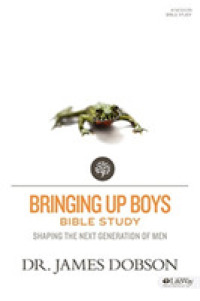- ホーム
- > 洋書
- > 英文書
- > Philosophy
Full Description
Infinity is paradoxical in many ways. Some paradoxes involve deterministic supertasks, such as Thomson's Lamp, where a switch is toggled an infinite number of times over a finite period of time, or the Grim Reaper, where it seems that infinitely many reapers can produce a result without doing anything. Others involve infinite lotteries. If you get two tickets from an infinite fair lottery where tickets are numbered from 1, no matter what number you saw on the first ticket, it is almost certain that the other ticket has a bigger number on it. And others center on paradoxical results in decision theory, such as the surprising observation that if you perform a sequence of fair coin flips that goes infinitely far back into the past but only finitely into the future, you can leverage information about past coin flips to predict future ones with only finitely many mistakes.
Alexander R. Pruss examines this seemingly large family of paradoxes in Infinity, Causation and Paradox. He establishes that these paradoxes and numerous others all have a common structure: their most natural embodiment involves an infinite number of items causally impinging on a single output. These paradoxes, he argues, can all be resolved by embracing 'causal finitism', the view that it is impossible for a single output to have an infinite causal history. Throughout the book, Pruss exposits such paradoxes, defends causal finitism at length, and considers connections with the philosophy of physics (where causal finitism favors but does not require discretist theories of space and time) and the philosophy of religion (with a cosmological argument for a first cause).
Contents
1: Infinity, paradox and mathematics
2: Infinite regresses
3: Supertasks and deterministic paradoxes
4: Paradoxical lotteries
5: Probability and decision theory
6: The Axiom of Choice Machine
7: Refinement, alternatives and extensions
8: Discrete time and space
9: A first cause
10: Conclusions







